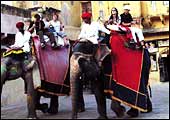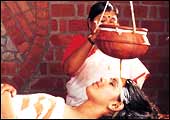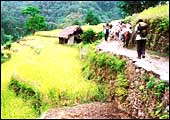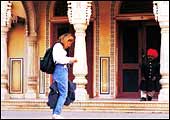|
|
|
BOLLYWOOD SET
|
 |
 |
|
CULTURE TOURISM
|
SPA
|
 |
 |
|
NATURE TREKKING
|
HISTORICAL SITES
|
| The
visitor to India is now more sure about what she wants to
see, creating a need for more specialised tour operations,
and, consequently, specialised jobs |
Sunil
Gupta, head, Leisure Travel, Thomas Cook India, knows that the
'India Visit' is in the throes of change. He is flooded with queries
on ecological tours to Bastar in Chhattisgarh, mountain biking,
spa destinations and even parasailing in the Himalayas. This is
not the same old traveller who was willing to be carted around
by guides spouting the same old drivel. This is the internet-age
traveller who is already loaded up on the country, and now wants
a holiday experience scripted with a lot more finesse. And India's
tour operators are scrambling to get their human resources in
shape to meet the challenge.
Bustle And Buzz
India drew some 3.5 million visitors from
overseas in 2004, and this year could easily see that figured
trumped. The hospitality industry, according to Rajesh Padmanabhan,
Senior Vice President (HR), The Oberoi Group, has seen higher
occupancy translate into new jobs for "revenue managers,
entertainment managers, sales solution providers and total travel
solution providers".
Meanwhile, the tour industry is in flux as
arrivals swell and operators undergo the wrenching forces that
so many other industries did once foreign players came in and
pitched their tents. In 2000, the Swiss major Kuoni bought Sita
and SOTC, sending rumbles through the industry. Recently, European
travel major TUI picked up a 50-per cent stake in Delhi-based
Le Passage to India, while Australia's Flight Centre took a stake
in Delhi's Friend Globe Travels. Meanwhile, Dubai-based Destinations
Of The World has set up office in India, and is on a hiring spree.
Expect further consolidation. Adapting to all this, of course,
means smartening up to just what tourists have on their minds
on their way to 'Incredible India'.
That means not just new jobs, but new kinds
of jobs. Overall, the industry is estimated to employ about 24
million people directly, and projected to take on two more million
over the next decade. The exciting part is that many of these
would be high-expertise jobs. In a way, tourism can't really remain
isolated from the knowledge revolution. Even monument guides,
for example, could now be trained to spice their narrative with
nuggets and witty asides that reveal a finer understanding of
the customer (thank goodness for the blogosphere).
Actual operators, of course, are expected
to have some idea of everything on offer. "Today, the job
in tourism is not merely taking orders over the phone," according
to Prashant Sahni, CEO, Tecnovate eSolutions, the BPO outfit of
ebookers, an online travel agency. "One is expected to understand
product options, and have destination knowledge-the job is more
of a consultant."
| The travel and tourism industry is projected
to employ two million people over the next decade |
Stretching Credibility
The big trend is job specialisation. "It
is necessary for survival," says Sunil Gupta, Head (Leisure
Travel), Thomas Cook, "and more manpower is required for
the specialist jobs." Theme tours are hot, and thematic expertise
is in big demand. India being India, the variety is virtually
limitless, with themes ranging from nature, wildlife, adventure
sport and spa therapy, to history, culture, religion, performing
arts and even film sets. To tour operators, gaining a thematic
edge is the way forward. "With competition becoming severe,
only niche players will survive," says Subhash Goyal, Chairman,
STIC Travels.
As well-educated youngsters enter the field,
the qualitative role of cultural tour package makers is undergoing
a transformation as well. "People still visit India for an
experience, and that is why culture could never be out of fashion,"
says Arup Sen, Ex |

